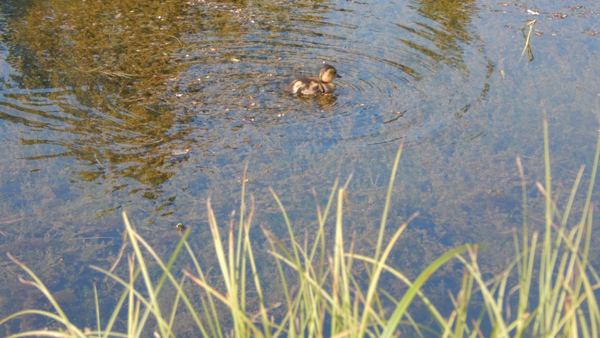
Tia-Marie Pambrun has spent a few days every week this summer at the Nisbet Trout Pond hoping to catch her first fish. Throughout August, though, the 11-year-old was excited to go to the pond for a different reason.
Tia-Marie and her parents found a friendly duckling at the pond, roughly 11 km west of Prince Albert, at the beginning of August—it was all alone, surviving without the care of its mother duck.
“We called him Splashly. Well, at first we called him Splash, and then Splashly,” said Tia-Marie, adding that her dad came up with the name.
“He was surviving out there on his own for, I’d say, well over a good month,” said Gwyn Pambrun, Tia-Marie’s mom.
Splashly still had his down feathers, she said. That’s the fluffy undercoating that keeps waterfowl warm; ducklings typically don’t grow their first feathers until they’re five to eight weeks old.
“He wasn’t scared of humans for some reason. He would come close to the humans, but he was trying to stay away from the other animals out there. There was an eagle out there, I guess there was some beavers, coyotes and bears out there as well.”
One day, Splashly was getting chased by the beavers. She said the duckling swam to shore as if to say “Okay, save me. I give up,” said Gwyn. When he walked on shore, one of his legs was turned inwards, like he was trying to walk on two left feet.
The family, along with another couple who frequents the trout pond, had been observing the duckling for about four weeks.
Tia-Marie and Gwyn said the couple told them when they would bring worms, the duckling would eat right from their hands.
“That’s why we got him worms. They said ‘We’ve got worms,’ and he just came rushing over,” explained Tia-Marie. The family also brought him wild bird seed to nibble on.
Tia-Marie said that as friendly as Splashly was, he likely didn’t trust them too much.
“He probably didn’t know if we were going to take care of him or if we would just eat him, but we would never. He won’t survive the winter,” she thought.
Luckily, thanks to the family and the other couple’s care, Splashly will survive the winter.
When Tia-Marie and her parents went to the trout pond on the weekend of Aug. 29, the duckling wasn’t there.
“We either thought conservation got him, he was hiding from the hawk, the hawk got him or a couple just took him in. And we were hoping the hawk didn’t get him. So thankfully the conservation got him,” she said.
They had heard the duckling had been rescued, but not the exact details of where he ended up.
The Wildlife Rehabilitation Society of Saskatchewan (WRSOS) received a call to its hotline on Aug. 27. The woman said she had been observing the duck for the last four weeks, and saw a coyote near the pond that day.
“She scooped the duck up and brought it home with her because she was concerned for it’s safety. She felt it was underdeveloped and couldn’t fly,” said WRSOS President Bonnie Dell.
“It certainly is encouraging to know that so many people care about wildlife.”
The duckling was taken to Park Range Veterinary Services in Prince Albert, which works with the WRSOS. Peter Surkan says injured wildlife coming in is quite common this time of year, but in this case, the duckling seemed healthy.
Surkan said the duckling likely hatched late. At this point, it did have its juvenile feathers.
He got in touch with Ashlee Bober of the Prince Albert SPCA, who he sees several times a week.
The SPCA doesn’t take in wildlife, but Bober lives on an acreage north of Prince Albert, where there’s a huge pond home to wild ducks.
“I took him home and made sure that he was eating and everything on his own and then was able to release him into the wild duck community out at my pond,” she said.
“He did go out there, went out into the pond and made some of his own little friends and now has his own little flock.”
Bober said the duckling was quite young, and still needed to learn from other ducks to take care of itself on its own.
“He’s definitely living a good life,” she said.
According to the WRSOS’s website, the non-profit organization received 3,560 calls to its hotline in 2019, helping 160 species in 282 communities. Orphaned wildlife concerns make up over 70 per cent of calls.
You can call the hotline at (306) 242-7177 and leave a message. They aim to return calls within 30 minutes.

